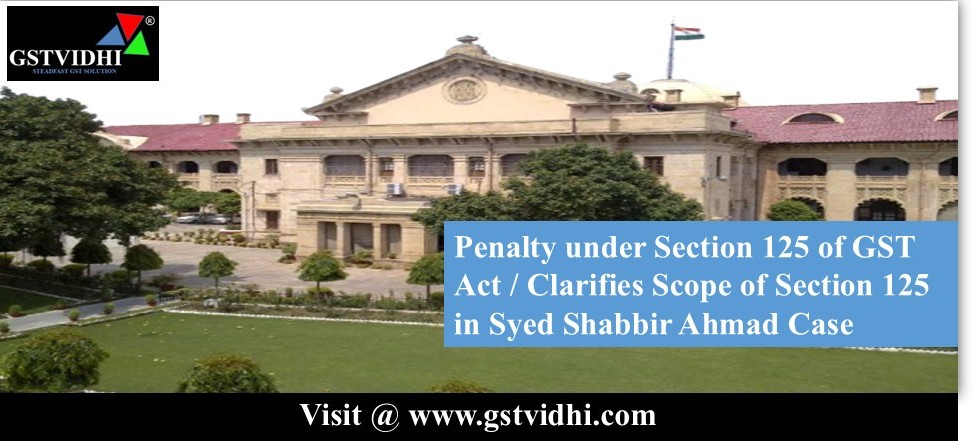
Penalty under Section 125 of GST Act / Clarifies Scope of
Section 125 in Syed Shabbir Ahmad Case
WRIT
TAX No. 451 of 2025 | Order Dated: 26 May 2025 | High Court of Judicature at
Allahabad, Lucknow Bench
Summary of
the Case
In a significant
clarification on the interpretation of Section 125 of the CGST/SGST Act,
the Allahabad High Court held that the maximum penalty of ₹25,000 under
the said provision cannot be duplicated separately for CGST and SGST,
thereby quashing a ₹50,000 penalty order passed against Syed Shabbir
Ahmad.
The Court held that imposing
₹25,000 under both CGST and SGST heads was contrary to the statutory cap.
It set aside the impugned order to the extent of ₹25,000 excess penalty,
confirming that the petitioner was liable to pay only ₹25,000 in total.
Background
of the Case
1. Penalty
Imposed Under Section 125: On 31 May 2024, a summary
penalty order was passed against Syed Shabbir Ahmad, imposing:
o ₹25,000
under the Central Goods and Services Tax (CGST) Act; and
o ₹25,000
under the State Goods and Services Tax (SGST) Act.
This totaled to ₹50,000.
2. Appeal
Filed But Dismissed on Limitation: The petitioner filed an
appeal against the penalty, which was dismissed on 4 December 2024,
citing bar of limitation.
3. Writ
Petition Filed: Aggrieved by both the quantum of
penalty and rejection of appeal, the petitioner approached the
Allahabad High Court through a writ petition.
Issues
Raised
1. Is
the imposition of ₹25,000 penalty under each of CGST and SGST separately
legally valid under Section 125 of the CGST Act?
2. Whether
the maximum penalty prescribed under Section 125 is ₹25,000 in total, or
₹25,000 per Act (CGST + SGST = ₹50,000)?
3. Can
a combined penalty exceeding ₹25,000 be imposed under a common violation?
Arguments
by the Petitioner
Learned counsel for the
petitioner made the following submissions:
- Section 125 of the CGST Act provides
for a maximum penalty of ₹25,000 for contraventions where no specific
penalty is prescribed.
- The same provision is mirrored under
the SGST Act.
- However, the taxpayer cannot be
penalized twice for the same default—once under CGST and again under
SGST—by applying the maximum limit under each Act separately.
- Such duplication violates the intent
of Section 125, which is designed to penalize generic contraventions within
a single ceiling.
Respondent’s
Stand
The State Tax Department
defended the order, arguing:
- Penalties were levied under two
separate legislations—the CGST Act and the SGST Act.
- Therefore, each Act allows for independent
imposition of penalty, subject to the cap under each.
- Since the CGST and SGST Acts operate
concurrently, dual penalty does not amount to illegality.
Legal
Provision: Section 125, CGST Act
“Any person, who
contravenes any of the provisions of this Act or any rules made thereunder for
which no penalty is separately provided in this Act, shall be liable to a
penalty which may extend to twenty-five thousand rupees.”
Court’s
Analysis and Observations
Justice Pankaj Bhatia
considered the language, purpose, and uniform application of the GST
penalty provisions.
1. Interpretation of
‘Maximum Penalty’
The Court held:
“Section 125 of the Act
prescribes levy of maximum penalty of ₹25,000. Imposition of ₹25,000
under CGST and another ₹25,000 under SGST is wholly unjustified.”
Hence, the dual
imposition was found legally excessive.
2. Single Act of Default
= Single Penalty
The Court emphasized that
the underlying contravention was common under both laws, arising
from the same facts.
“The imposition of
penalty under both CGST and SGST heads for the same default amounts to double
jeopardy in the administrative realm.”
3. Relief Despite
Dismissal of Appeal
Although the petitioner’s
statutory appeal was dismissed as time-barred, the Court invoked writ
jurisdiction under Article 226 to examine the correctness of penalty.
“Considering the mandate
of Section 125… the order dated 31.05.2024 is set aside to the extent it
imposes penalty of ₹25,000 each under CGST and SGST.”
Final
Judgment
1. Order
Partially Set Aside: The impugned penalty order dated 31
May 2024 is set aside to the extent it imposes ₹50,000 penalty.
2. Reduced
Penalty: The petitioner shall be liable to pay only
₹25,000 in total as penalty under Section 125.
3. Writ
Petition Disposed: The petition was disposed of in these
terms, restoring legal clarity and proportionality.
Conclusion:
This ruling clarifies an
important interpretive ambiguity in GST enforcement—whether penalties under
CGST and SGST can be independently and concurrently imposed for the same
offense.
The Allahabad High
Court’s judgment aligns with the spirit of "One Nation, One Tax", by
preventing unjust enrichment of the state via parallel penalty imposition.
It also serves as
guidance for assessing officers and appellate authorities to exercise restraint
and uniformity, especially under residuary penalty clauses like Section 125.
Disclaimer: All the Information is based on the notification, circular and order issued by the Govt. authority and judgement delivered by the court or the authority information is strictly for educational purposes and on the basis of our best understanding of laws & not binding on anyone.
Press On Click Here To Download File
Click here